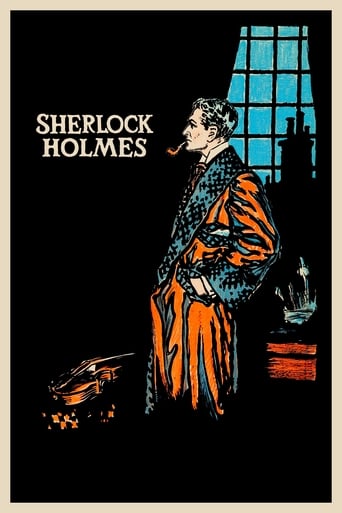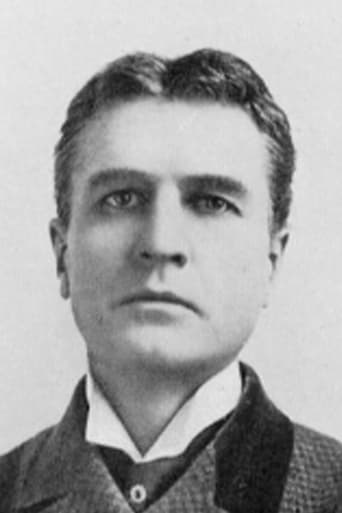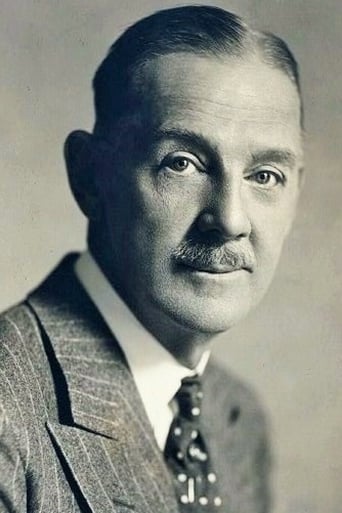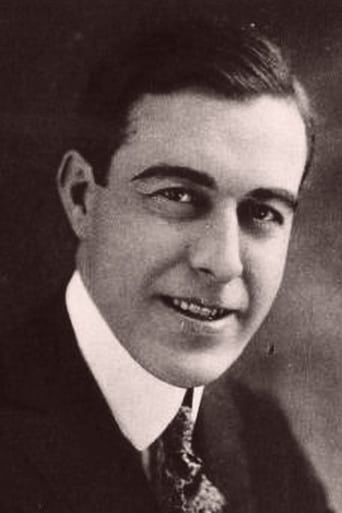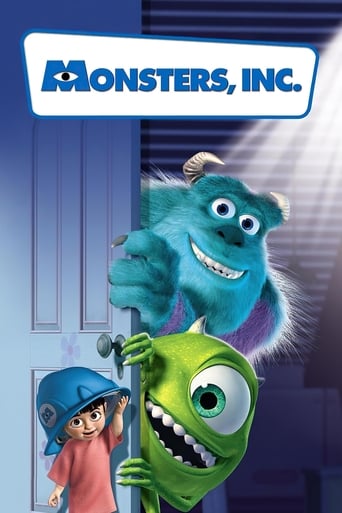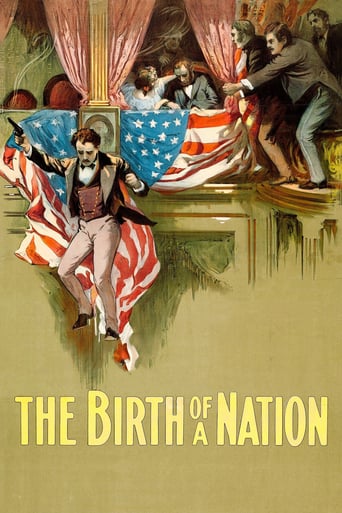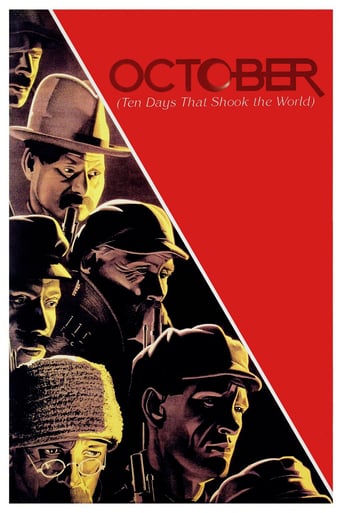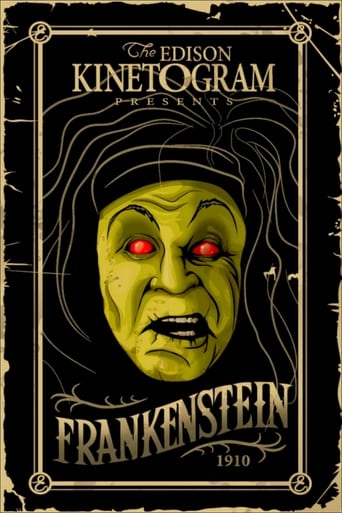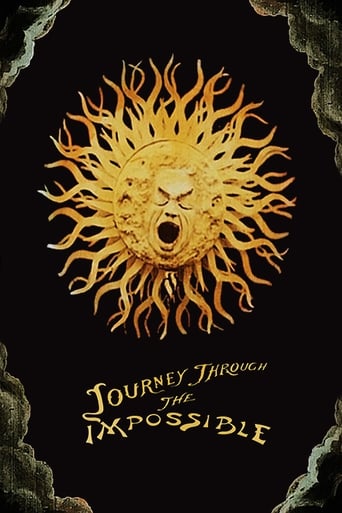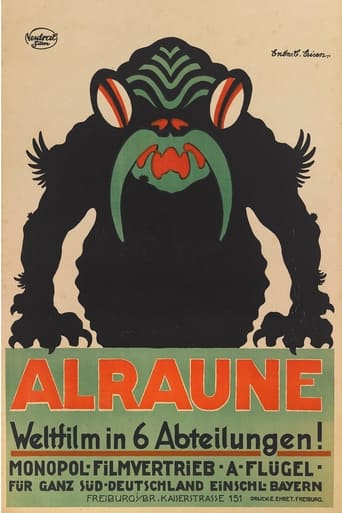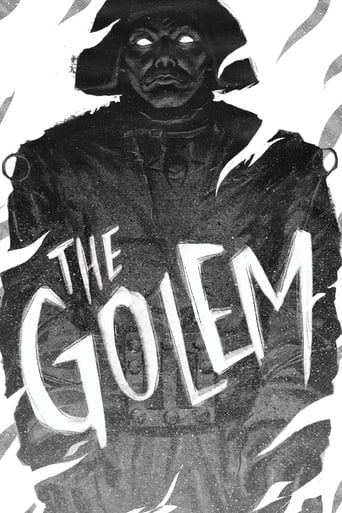Sherlock Holmes (1916)
When a couple of scammers hold young Alice Faulkner against her will to discover the whereabouts of letters whose dissemination could cause a scandal affecting the royal family, Sherlock Holmes decides to take over the case. (Considered lost, a copy was found in 2014, in the vaults of the Cinémathèque Française.)
Watch Trailer
Free Trial Channels
Cast


Similar titles
Reviews
Perfect cast and a good story
i know i wasted 90 mins of my life.
The movie turns out to be a little better than the average. Starting from a romantic formula often seen in the cinema, it ends in the most predictable (and somewhat bland) way.
The movie turns out to be a little better than the average. Starting from a romantic formula often seen in the cinema, it ends in the most predictable (and somewhat bland) way.
After being so let down by the 1922 John Barrymore Sherlock Holmes, which boasted a lackluster leading lady and way too many intertitles, I was not expecting too much from the long-lost 1916 version, in spite of the presence of William Gillette. Thankfully, I was wrong: this is a well-paced, atmospheric, and well-acted picture. Thank God it was found.For someone who never acted in front of a camera before, Gillette is phenomenal. Like Sessue Hayakawa and Mary Pickford, here was another actor who understood the camera came with its own rules, a need for a greater subtlety which comes with the intimacy of the projected image. Self-assured, intelligent, and understated, Gillette is a great Holmes; no wonder he was so influential in our modern conceptions of the character.The plot itself (based off the popular 1890s stage play and later used for the bland 1922 film) is a mess, a mish mash of images, characters, and story elements from an assortment of the original Holmes stories. Some of the developments are silly and there are some plot holes, but what keeps the film from sinking are the mysterious atmosphere and the charisma of the performers. The pacing is slow, but never boring. I can only describe the picture as having a hypnotic quality.Many are put off by the addition of a love interest for Holmes, but I don't mind too much. At least he and Alice have some chemistry. It makes me think a lot of the 1970 film The Private Life of Sherlock Holmes, where director Billy Wilder examines the emotions behind the famous detective's rational reserve.Film buffs and Holmes devotees will be interested. Give it a watch.
The great news was told to us recently on TCM, accompanied by a premiere showing; a copy of "Sherlock Holmes" was found and restored earlier this year year in France. It was originally released as a 4-part feature in 1916 but was released in France as a 7-part serial in 1920. It has been restored to its original 4 parts and that is what we saw here on TV. It is great news since it is the only existing film of Sherlock Holmes' most famous impersonator, William Gillette.As impressive as the restoration was, with its alternate scenes tinted blue and orange (the orange seemed gold, but no matter), the story itself was simplistic in nature and lacked the resourceful cleverness of Doyle's stories. Maybe it was the only way to tell a story on film without the benefit of dialogue, but this one was straightforward and without guile. A young woman is held against her will so her kidnappers could make her tell the location of some letters of hers, which could be used for ransom. Holmes wants to help her, and so he does. The bad guys get their comeuppance and all is right again.Gillette was 60 at the time and was probably heavily made up. Otherwise it would have been a stretch to have him win the heart of the damsel in distress. In no other Holmes story did he 'get the girl'. Nevertheless, it was rewarding to finally view this lost treasure and to realize another lost film could be preserved for posterity.
SHERLOCK HOLMES (Essanay, 1916), directed by Arthur Berthelet, is not the first nor the last motion picture produced depicting on the most recognizable and famous fictional detective of all time, Sir Arthur Conan Doyle's Sherlock Holmes. What makes this edition so special is it's historical account and reproduction and cast reprising their original roles from the popular stage play, notably William Gillette (1855-1937), the actor long associated with the title role decades before Basil Rathbone won that honor though his 14-film theatrical series produced by Universal in the 1940s. Anyone familiar with the carnation of Rathbone (Sherlock Holmes) and Nigel Bruce (Doctor Watson) would immediately realize how little the renown forties series and Gillette's screen adaptation have nothing in common, not even any by-plays and great chemistry between Holmes and Watson that made the Universal films work so well.As with many silent films of this nature, prints to SHERLOCK HOLMES have been lost to extinction until (according to the title cards with tiny printing readable only through the use of a magnifying glass) inserted prior to the opening credits), "a print was discovered in France 2014, with French-language inter-titles translated back to English." Another interesting fact is that this 1916 production was initially released as a seven reel feature while the European release in 1920 was extended with French inter-titles formatted into a four-part chaptered serial edition: ( "The Prince's Letters," "Moriarty vs. Sherlock Holmes," "A Tragic Night," and "The Triumph of Sherlock Holmes"). The restored 116 minute, color-tinted, accu-speed silent film process, completed by January 2015, would make its world television premiere October 18, 2015, on Turner Classic Movies cable channel.Following the opening sequence capturing the legendary stage actor, William Gillette, as Sherlock Holmes, working on experiments in his laboratory, the introduction of its supporting players of the four-act story are as follows: The Larrabees, James (Mario Majeroni) and Madge (Grace Reals), unscrupulous adventurers; Alice Faulkner (Marjorie Kay), a young girl whose abused sister, now deceased, having been entrusted the indiscreet love letters written to her by the crown prince; Baron Von Stalburg (Ludwig Kreiss), the prince's assistant, and Sir Edward Leighton (Stewart Robbins), a British official, knowing the great value of those letters, attempting to retrieve them; Sid (William Postance), a resourceful cracks-man and member of the Larrabee gang; and Doctor Watson (Edward Fielding), Holmes' occasional confident. As Sherlock Holmes is hired to retrieve the stolen letters, as well as protect and later rescue the abducted Alice, the ace detective also encounters his arch enemy, Professor Moriarty (Ernest Maupain), getting into the act with the villains while at the same time avenging himself on Holmes; and Billy (Burford Hampden), a boy secretly assisting Holmes supplying him with some valuable information needed for his investigation.Considering when SHERLOCK HOLMES was made, one can forgive primitive stand-still camera technique and limited visual close-ups on central characters most associated with movies nowadays. The acting style and method of storytelling can prove disappointing to contemporary viewers, which in fact, it is. At least it wasn't too stage bound.As much as it's a film buffs dream having lost silent movies rediscovered and available for viewing again, especially the opportunity of seeing the actual visual image of William Gillette captured on film, rather than associating his name with his Gillette Castle home overlooking the Connecticut River. The disappointment in general lies mostly by its new scoring that accompanies this movie. Definitely not for its listening pleasure considering this being shown for the first time in nearly a century. The piano accompaniment is okay, but its overuse of violin playing simply ruins it. This film deserves better. Had SHERLOCK HOLMES been discovered in the 1960s, no doubt it would have sufficed on public television during the nostalgia boom of the 1970s with excellent William Perry piano or Gaylord Carter organ scoring from the Killiam Collection. A pity this didn't happen here.The title SHERLOCK HOLMES would be used again in latter screen adaptations: (Goldwyn, 1922) starring John Barrymore (Holmes), Carol Dempster (Alice Faulkner) and Roland Young (Doctor Watson); and (Fox, 1932), talkie edition with the Gillette look-alike Clive Brook (Holmes), Miriam Jordan (Alice Faulkner) and Reginald Owen (Doctor Watson), all forgotten editions with limited reissues and appeal in modern times, yet there's more to Sherlock Holmes of the movies than anyone would come to realize. This is one of them. (**)
There are two things to recommend this film. First of all, it is in marvelous condition for something made in 1916. Secondly, we get to see the famous William Gilette, who played the great detective over 1000 times on the stage. This version is the stage version, sans most of the dialogue. The story is a bit confusing at first, but it involves a young woman whose sister had an affair with royalty. She has letters that would prove embarrassing to a prince. Holmes has been hired to get those letters (like in "A Scandal in Bohemia"). There are a man and his wife, the Larabees, who also want to get their hands on those letters in order to turn a profit. Enter Moriarity, Holmes' arch rival. There are a series of ridiculous plots that don't work because people are stupid. The young woman is clueless. She also becomes a love interest for Holmes. This is out of bounds in the canon. One thing lacking is that Holmes is uninteresting and dull. He is coy and sad. His overconfidence is his greatest trait and he has none of that here. Still, as a period piece, it is fun.

